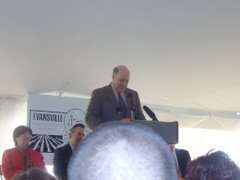Tuesday, September 11, 2012
Mailbag: Vinehout Writes: Child Poverty Challenges Stressed Schools
Child Poverty Challenges Stressed Schools
“There are a lot more hungry kids than there used to be,” the reading teacher said. “Every teacher I know has a stash of granola bars in their desk. When the student is hungry and can’t concentrate, the teacher pulls out the granola bar.”
Wisconsin experienced a dramatic up-tick in the number of children living in poverty. Census data show the number of school age children in poverty rose to about one out of six children in 2010.
According to the US census two-thirds of Wisconsin counties experienced a significant increase in child poverty over the last three years. According to a Department of Public Instruction (DPI) memo every county but one in the new 31st Senate District experienced a significant increase in child poverty.
One consequence of growing poverty is a growing achievement gap. There are many factors that influence student achievement such as access to health care, safe housing, and poverty. Studies show that children living in poverty and minority children are less likely to succeed in school. This pattern exists throughout the US, but when it comes to the gap between white and black students in 8th grade math, Wisconsin leads the nation.
This week the Senate Education Committee heard testimony about how the historic cuts to education funding in the last state budget makes addressing the problems of poverty more difficult.
The $1.6 billion cut to education funding included special state aid given to school districts to help with special needs – including districts with high poverty.
In 2007, my legislative colleagues and I created the special ‘High Poverty Aid’ to help school districts with high poverty numbers. At that time only 23 schools met the requirement of at least half of their students being eligible for free and reduced lunch (a measure of poverty). This year, the number of eligible schools has quadrupled. The reduced amount of aid will not keep pace with the increasing poverty statewide. Schools are forced to do more with less.
Researchers testified at the hearing that students in poorer districts suffered more under the most recent round of budget cuts even though taxpayers in these poorer districts paid more.
They explained that teachers and support workers make up about 80% of a school’s budget. When money is tight, it is personnel that are lost.
Using DPI data, UW Professors Jim Shaw and Carolyn Kelley discovered the poorest 30 school districts lost almost six times more staff than the wealthiest 30 school districts.
Shaw and Kelley argued for “strategic increases in teacher salaries to improve performance and teacher incentives and portability of pensions to recruit high quality teachers to high need schools.”
“We need to realign resources,” said Professor and former Racine Superintendent Jim Shaw. “We are at a really good time to talk about a new way. We know the strategies that are really effective: summer school, after school programs, preschool. It would be wise to look at the most effective way to close the achievement gap.”
To help all children be successful, our state education dollars must be wisely invested. Committee members were urged to pass State Superintendent Tony Evers’ Fair Funding for Schools Plan. This idea pays schools a minimum amount just to open the doors and keep on the lights. Poverty and the communities’ ability to pay are factors included in state aid received by the local school from the state.
Fair Funding for Schools is an important part of the answer and critical to the economic success of our state.
In the meantime, teachers I know are stocking up on granola bars and other items that help poor children deal with the stress of poverty and prepare them to learn.
If you know someone who would like to be added to this distribution list, please let us know.
If you wish to unsubscribe from this newsletter, reply with "Unsubscribe" in the subject line
Sen.Vinehout@legis.wisconsin.gov State Capitol Room 316 South - P.O. Box 7882, Madison, WI 53707-7882 Toll Free: (877) 763-6636 or
(608) 267-2871
Subscribe to:
Post Comments (Atom)






























No comments:
Post a Comment